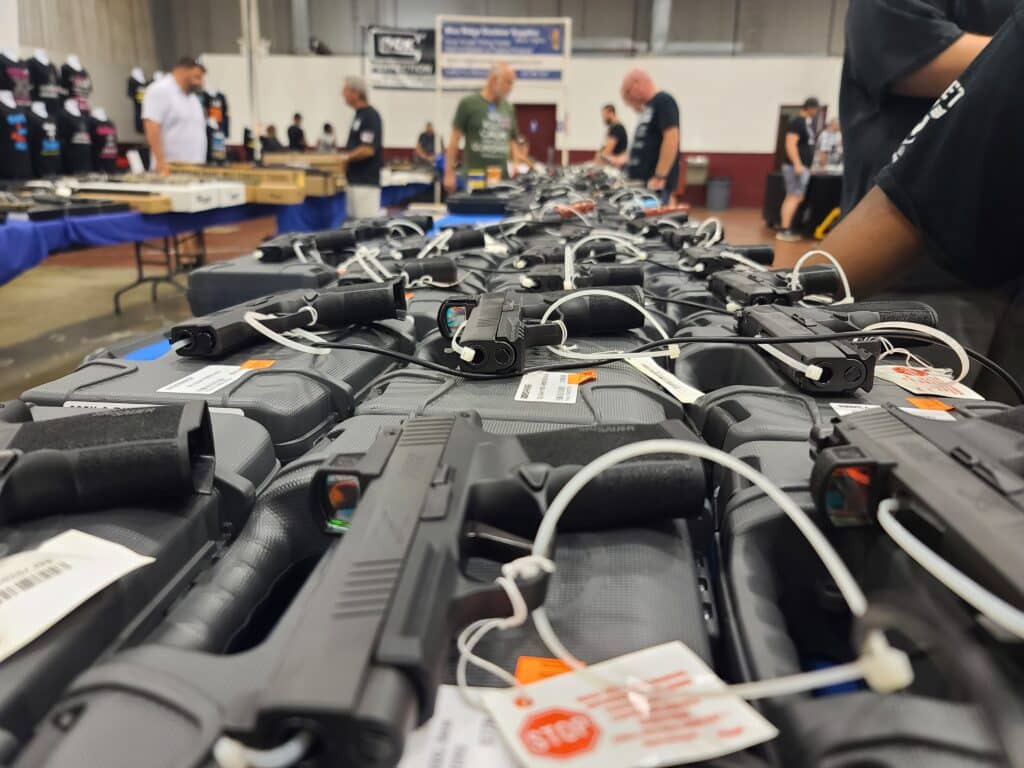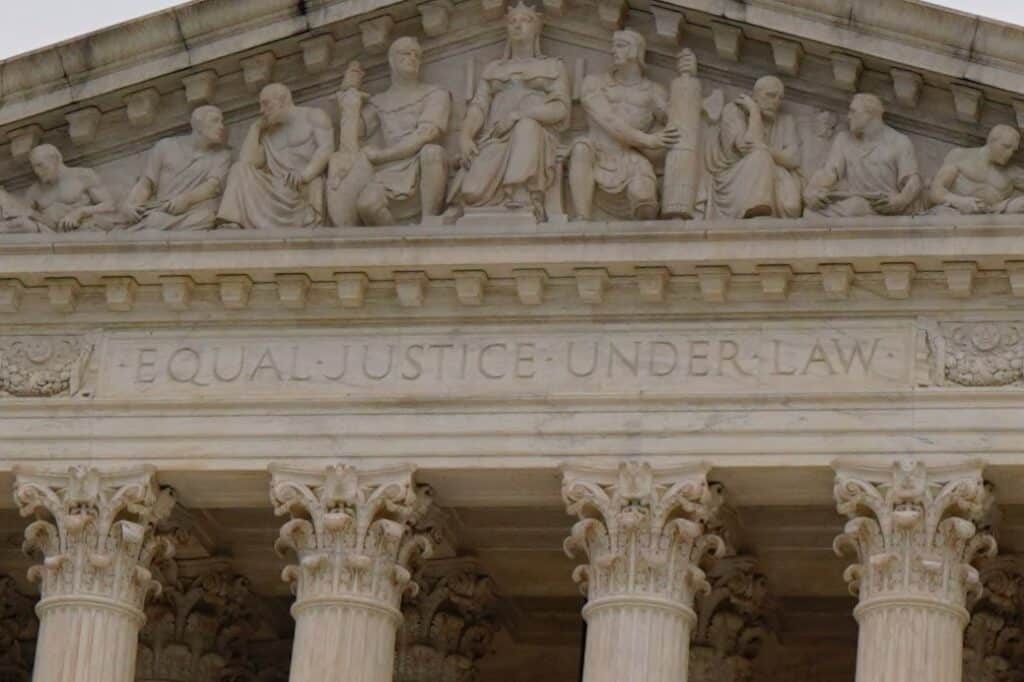The Garden State has finally used its new gun industry liability law. That could be the law’s undoing.
As Contributing Writer Jake Fogleman explains below, the thing that saved the law in federal court was the fact it hadn’t actually been used before. I guess we’ll get to see if that appeals court panel was genuine when it used that reasoning to dismiss the earlier case against the law…
I also take a close look at the Supreme Court’s decision not to grant an emergency injunction against an Illinois “assault weapons” ban. How much can we read into that, especially since it continues a recent trend from the Court? Should gun-rights advocates be worried and gun-control advocates elated?
Plus, Discourse Magazine’s David Masci joins the podcast to discuss gun sales as a chaos indicator.

Analysis: Why New Jersey Might Help the Gun Industry By Suing It [Member Exclusive]
By Jake Fogleman
New Jersey Attorney General Matthew Platkin (D.) filed “public nuisance” lawsuits against gun companies for the first time this week. It could be the undoing of the law that allowed him to do so.
On Tuesday, Platkin announced his office was filing separate lawsuits against a New Jersey gun store and a Pennsylvania gun show promoter/unfinished firearms parts kit seller. The first suit alleges that FSS Armory, a New Jersey-based federal firearms licensee (FFL), engaged in “unlawful and reckless practices” because thieves broke into the store and stole 20 firearms from store displays in the middle of the night in January.
The second suit alleges that Eagle Shows and JSD Supply—separate businesses under the same ownership—have “targeted the sale of ghost gun products to New Jersey residents” by holding gun shows in Pennsylvania and offering unserialized firearms parts for sale at those shows.
The suits state that some of the guns stolen in the FSS Armory burglary and firearms purchased from Eagle Shows have been recovered by New Jersey police.
“Today’s action should make New Jersey’s position clear: Gun traffickers and their enablers will be held accountable when their actions place our residents in danger,” Platkin said of his office’s suits. “Gun dealers and the firearms industry must abide by our laws or face the consequences.”
The complaints were made possible thanks to a recently enacted state statute that allows the attorney general to sue gun industry members if he believes they “contribute to a public nuisance” by failing to maintain “reasonable controls” over the sale, manufacture, and marketing of firearms-related products. It was modeled after a 2021 New York law and has since been replicated in at least a half-dozen additional blue states—including Delaware, Colorado, Illinois, Washington, California, and Hawaii—in what has quickly become a new successful push for the gun-control movement.
Despite their popularity among gun-control advocates, the staying power of public nuisance laws like New Jersey’s faces a clear problem. The 2005 Protection of Lawful Commerce in Arms Act (PLCAA) is a federal civil liability shield for the firearms industry. It explicitly precludes lawsuits against gun companies for the criminal misuse of their products by third parties.
The PLCAA’s existence has given the gun industry and its trade association, the National Shooting Sports Foundation (NSSF), a powerful weapon in their legal fight against the spread of the laws. It even helped the group secure an order blocking New Jersey’s version earlier this year.
“A1765 would subject manufacturers, distributors, dealers, and importers of firearms or ammunition products and their trade associations to civil liability for the harm solely caused by the criminal or unlawful misuse of firearm or ammunition products by others,” U.S. District Court Judge Zahid N. Quraishi, a Biden appointee, wrote in his opinion. “This is in direct conflict with the PLCAA’s purpose. Accordingly, the Court finds that NSSF is likely to succeed on the merits that A1765 does not fall within the predicate exception of the PLCAA and is therefore preempted by the PLCAA.”
But the group’s victory against the Garden State proved to be short-lived. A three-judge panel for the Third Circuit Court of Appeals overturned Judge Quraishi’s ruling and dismissed the NSSF’s suit in August. However, the decision was not based on the merits of New Jersey’s law. Instead, the court said the group’s legal challenge was premature.
“The National Shooting Sports Foundation challenges a new state gun law as violating its members’ constitutional rights. But we see little evidence that enforcement is looming,” Judge Stephanos Bibas, a Donald Trump appointee, wrote on behalf of the unanimous panel in NSSF v. Platkin. “Because the Foundation has jumped the gun, its challenge must be dismissed.”
Now that Platkin has officially taken three gun businesses to court under the public nuisance law, issues over standing will no longer be available as a shield to avoid deeper legal scrutiny of its viability under the PLCAA.
NSSF General Counsel Larry Keane previously told The Reload that his group would refile its lawsuit against New Jersey if Platkin ever enforced the law. He said he felt confident in the group’s chances of winning on the merits of the case.
“It is important to note the court did not say New Jersey’s law does not violate the Protection of Lawful Commerce in Arms Act (PLCAA); it clearly does,” he said following the Third Circuit’s dismissal order. “During oral arguments, the panel appeared to have concerns with the law, as did the district court that enjoined enforcement.”
Mark Oliva, a spokesman for the group, told The Reload that NSSF was aware of the new lawsuits filed by the New Jersey attorney general, but it “has not yet” refiled its challenge to the law.
Once it does, it should be on firmer legal ground in its push to have it thrown out.
Podcast: The Problem With Chaos Spiking Gun Sales (Ft. Discourse Magazine’s David Masci) [Member Early Access]
By Stephen Gutowski
This week, we’re taking a look at record gun sales from a different point of view.
The spike in new gun owners seen from 2020 through 2022 is one we’ve spent a lot of time examining because it’s very likely to have a significant impact on American society, culture, and politics. Gun owners generally see the addition of millions more Americans to their ranks as a positive thing, even while understanding uncertainty is what likely drove many of them to the store.
But Discourse Magazine editor David Masci wrote a piece recently noting the straightforward problem of high gun sales in an era where sales have come to serve as a kind of chaos meter. He joins the show to discuss the concerning idea that more people are buying guns because more people are feeling insecure in America. He argued that even if you believe in gun rights, as he does, that trend should be worrying.
We have a discussion about this particular implication of the recent shift in gun culture from a hunting-first mindset to a self-defense one. And we talk about the overarching factors that have led American society to this point, both good and bad.
Plus, Contributing Writer Jake Fogleman and I examine the Supreme Court’s recent refusal to grant emergency relief to gun-rights plaintiffs.
You can listen to the show on your favorite podcasting app or by clicking here. Video of the episode is available on our YouTube channel. Reload Members get access on Sunday, as always. The show goes public on Monday.

Analysis: What to Make of SCOTUS Denying Gun-Rights Plaintiffs’ Emergency Requests [Member Exclusive]
By Stephen Gutowski
The Supreme Court declined to take up an emergency request to block an Illinois city’s “assault weapons” ban on Thursday.
That’s the fourth emergency request from gun-rights plaintiffs the Court has denied. At the same time, it has acted on two emergency requests by the federal government to intervene in a gun case.
So, what can we make of that?
One thing it doesn’t tell us is how the Court will ultimately come down on the merits of each case. It likely doesn’t mean the Supreme Court is going to approve of bans on popular firearms like the AR-15 or home gun building or the myriad of new gun-free zones instituted by the same states the Court just rebuked last year.
One takeaway, though, is the Court is pretty conservative in the non-ideological sense. It seems more inclined to allow the government leeway in enforcing gun restrictions as the cases against them unfold than it is to short-circuit the legal process in favor of plaintiffs. It appears to trust the government when it warns that not intervening against lower court injunctions could do more to upend things around the country than plaintiffs’ warnings that not issuing injunctions denied by lower courts does the same thing.
So, the Court trusts the government more when it comes to taking emergency action on guns. That’s probably a concerning development for gun-rights advocates. It may even lead some to conclude the Court has changed its mind on the Second Amendment.
After all, it was just last year SCOTUS handed down a landmark decision in New York State Rifle and Pistol Association v. Bruen. That ruling declared public gun carry a protected right and set a new test for determining if a gun restriction is constitutional. The test centered around whether the regulation fits in a historical tradition that dates back to the Founding Era, something most scholars view as a very high bar.
But when New York instituted a law with the net effect of making it more difficult to legally carry a gun than the one the Court struck down, it declined to act on an emergency basis after the Second Circuit Court of Appeals stayed a lower court ruling against the law–effectively letting it go into effect. It did the same thing regarding aspects of the New York law that restrict gun sales. Then, it refused to issue an emergency injunction against Naperville, Illinois, after a lower court upheld its AR-15 ban. Now, it’s done it again after a Seventh Circuit panel also upheld the ban.
The Department of Justice and ATF have faired much better on the emergency docket. In August, the Supreme Court issued an emergency stay on US District Judge Reed O’Connor’s decision to block enforcement of the ATF’s “ghost gun” ban despite a Fifth Circuit panel declining to do so. After Judge O’Connor issued another, more limited injunction, SCOTUS intervened to stay that one too.
Beyond its actions, the Court has given us little to go off of in understanding its thinking.
Only two of the decisions gave us any written indication of why the Court has taken this path. The first is relatively small. In the ghost gun case, SCOTUS set its stay to last until it decides whether to take up the case once the inevitable appeal reaches that point in the process.
That suggests the Court wants the normal legal process to play itself out.
The second written opinion is a bit more extensive. Justices Samuel Alito and Clarence Thomas wrote a concurrence in the New York gun-free zone case explaining some of their reasoning. And it also indicates there’s a uniform desire to let the lower courts fully process these cases.
“I understand the Court’s denial today to reflect respect for the Second Circuit’s procedures in managing its own docket, rather than expressing any view on the merits of the case,” Alito wrote in Antonyuk v. Nigrelli.
The pair said the case involves unique concerns that arise from the implications of the recent Bruen ruling. That indicates they may want the lower courts to develop a complete record before it ultimately considers the merits.
“The New York law at issue in this application presents novel and serious questions under both the First and the Second Amendments,” Alito wrote. “The District Court found, in a thorough opinion, that the applicants were likely to succeed on a number of their claims, and it issued a preliminary injunction as to twelve provisions of the challenged law.”
It’s important to note that, unlike in the years after its landmark Heller ruling, the Court isn’t avoiding Second Amendment cases. It just heard oral arguments in United States v. Rahimi, which deals with the federal prohibition against people subject to domestic violence restraining orders owning guns. And those oral arguments suggest the Court will probably take up the other two cases on who can be barred from owning a firearm that are currently pending before it.
Still, the most convincing evidence the Supreme Court hasn’t changed course on the Second Amendment is actually its silence.
So far in these emergency requests, Alito and Thomas are the only justices to say anything about any of the cases. And their message was that the injunction against New York’s law was “thorough.” None of the justices have spoken out to defend the ATF’s ghost gun ban.
More importantly, none of the justices have spoken out to complain the Court isn’t performing its duty to protect the Second Amendment. That’s the strongest indicator there probably hasn’t been much concrete movement on how a majority of justices are likely to view the Second Amendment. While it’s tough for outsiders to know for sure which way the Court is leaning at any given time on any given issue, it’s a bit easier for the justices themselves to have a feel for it.
That Alito and Thomas haven’t voiced any concerns about the Court’s lack of emergency Second Amendment action says a lot. After all, one of the most common opinions you saw on the Second Amendment before Bruen was the insistence, especially from Thomas, that the Court was treating it as a second-class right because it wasn’t taking up cases. He even featured that point in complaints about how lower courts had interpreted the amendment when writing Bruen.
It’s certainly possible there aren’t five votes against an AR-15 ban, ghost gun ban, or expansive gun-free zones–even if Bruen seems to imply otherwise. Perhaps some justices have even rethought their position on the Second Amendment post-Bruen. But there isn’t much hard evidence of that yet.
If Thomas or Alito start issuing dissents alongside these denials, especially ones that argue the Court has begun treating the Second Amendment as a second-class right, that’s when gun-rights proponents should really start to worry about the bigger picture. Of course, that’s a small comfort for those living under restrictions they consider unconstitutional in the meantime.
That’s it for now.
I’ll talk to you all again soon.
Thanks,
Stephen Gutowski
Founder
The Reload







